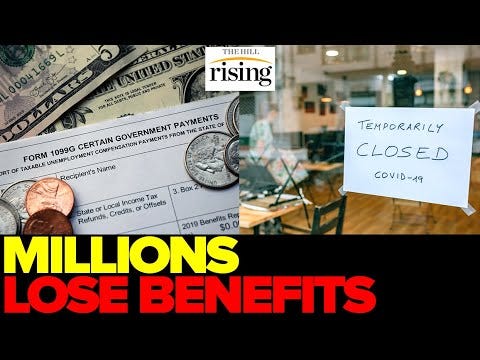Labor Secretary: ‘Not Sure’ Economy Gets to Pre-Pandemic Levels by End of 2021, ‘We Can Get Pretty Close’ in Next Year
However, federal unemployment aid must be continued, Clinton-era Cabinet official says
Even as the nation continues to struggle with newly resurgent high numbers of COVID-19 cases and the worst job numbers reported in August this year, Labor Secretary Marty Walsh holds out hope that the US economy can return to pre-pandemic levels in the next year or so.
However, as it stands, the pandemic still remains and millions of Americans are out of work — and that requires Congress to reauthorize the federal supplemental unemployment benefits which expired Monday.
That's according to one of Walsh's predecessors at the head of the Labor Department, Robert Reich.
The federal government last week reported the weakest jobs growth since President Biden came to office in January.
Meanwhile, between the virulent Delta variant and those Americans on the political right who refuse to get vaccinated, the United States is seeing a steep uptick in cases of COVID-19 after experiencing a sharp drop off earlier this summer due to the Biden administration's aggressive vaccination efforts.
Walsh countered the sour notes by saying that the US economy has added 4.5 million jobs and 70 percent of eligible Americans have been vaccinated since Biden took office.
“I think there is a light at the end of the tunnel and I think it’s incumbent upon all of us to make sure we’re vaccinated, make sure that we’re still keeping each other safe and watching out for your own personal health with the pandemic. I think that we really need to continue to get people vaccinated,” he said. “There’s still parts of this country that large numbers of people aren’t vaccinated and we’re seeing the largest hits of Delta variant there. Also in those areas we’re seeing hospitals overrun with people and some concern. So I think definitely there’s a light at the end of the tunnel, it’s just a matter of us continuing to move forward.”
Asked if the US economy would return to pre-pandemic in the “next year or so,” Walsh replied, “I would hope so. Again, the pandemic, the virus is very unpredictable. I think we can get pretty close to it. I think a lot of people are hoping by the end of this year we’ll be there.
“I’m not sure if that’s going to be the case, but again, we’re dealing with a pandemic. I think that listening to what the science says, listening to what the experts say, we’ll get through this together,” he added.
Extension of jobless benefits
Meanwhile, while the nation remains in the grip of the pandemic, its jobless continues to require the federal supplemental benefits which Congress had authorized but expired Monday, according to Reich, who led the Labor Department during the Clinton administration.
The long-term unemployed and so-called gig workers have no alternative for support without additional federal benefits, which amounted to $300 a week.
In all, the expiration of the federal benefits affects some 7.5 million jobless Americans.
Specifically, Democrats should include the extension of the supplemental benefits in the $3.5 trillion spending package they plan to pass under the process known as “reconciliation.”
“This is where the bill that is winding its way through Congress, that $3.5 trillion, becomes so critical. It’s not as if the pandemic is going away. … People need the help that is in this $3.5 trillion bill,” said Reich, who today is a prominent progressive economist known for his YouTube videos. “They need help with child care. They need help with a safety net that’s a stronger safety net. People need to make sure that children, in fact, all of us have a responsibility to make sure that child poverty drops.
“It’s all in this bill. I think the real question is: Is there enough urgency? Do people care enough? Is there enough sense that the timing is right to get this bill actually enacted? Along with the infrastructure bill. Both are critical,” Reich added.
Do you find this post of value?
Please share it…



